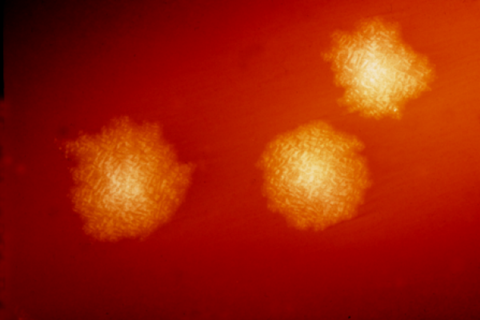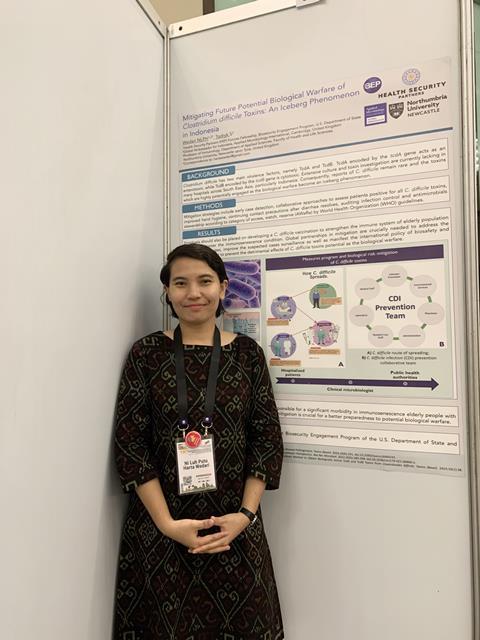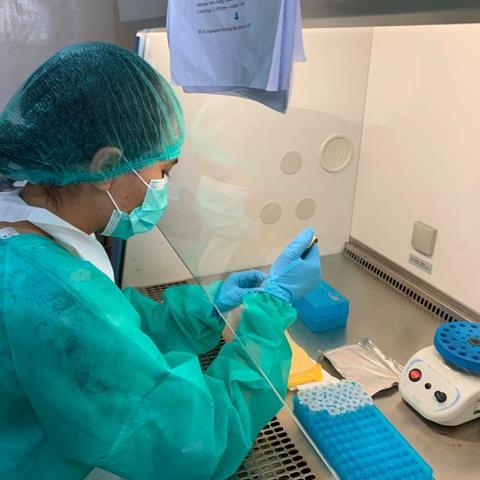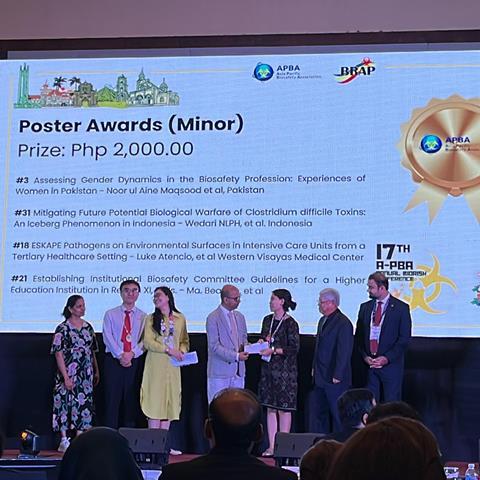International biosafety standards need to be updated to curtail the threat of Clostridioides difficile toxins being deployed for biological warfare.
That’s the warning from Applied Microbiology International Global Ambassador for Indonesia, Dr. Ni Luh Putu Harta Wedari, M.Med, Sp.MK whose poster presentation on her C. difficile research received an Honorable Mention Award at the 17th Asia-Pacific Biosafety Association (A-PBA) Annual Biorisk Conference in Manila, Phillippines.

“C. difficile infection (CDI) is an anaerobic gram-positive bacillus, capable of forming spores and toxins, transmitted to humans by the faecal-oral route. CDI is recognized as a typical cause of healthcare-associated infections (HAIs) and contributes to a significant proportion of morbidity and mortality of hospitalised patients,” she told The Microbiologist.
“Extensive culture and toxin investigation are currently lacking in many hospitals across South East Asia, particularly Indonesia. Consequently, reports of C. difficile remain very limited and the toxins which are highly potentially engaged as biological warfare become an iceberg phenomenon.”
Virulence factors
Dr. Wedari said C. difficile spread by the faecal-oral route has two main virulence factors. TcdA encoded by the tcdA gene acts as an enterotoxin, pro-inflammatory and fluid accumulation; while TcdB encoded by the tcdB gene is cytotoxic, causes disruption of the actin cytoskeleton, and causes disruption of tight junctions in colon cells.

The disease remains a major global threat responsible for a significant morbidity in elderly patients due to the immunosenescence effect with declining function of T-cells and B-cells. Elderly age, hospitalisation, exposure to antibiotics e.g., cephalosporins, fluoroquinolones, clindamycin, and penicillin contributed as main risk factors of CDI.
“This study design was a cohort prospective study with faecal sample collection from elderly diarrhoea patients with comorbidities, history of antimicrobial consumption and chemotherapy in Denpasar City healthcare centres, Bali, Indonesia, during 1 December 2022 until 30 September 2023. 40 elderly diarrhoea patients met the inclusion criteria. 8 samples (20%) were positive for 16s rRNA, tcdB positive in 3 samples (7.5%), however 0 samples (0%) with tcdA,” Dr. Wedari said.
Elderly patients
This study focused on CDI in elderly individuals, since they are prone to immunosenescence, and was a prospective study in exploring the relations between tcdA and tcdB genes of C. difficile as the adverse effects of antimicrobial resistance and chemotherapy exposure on those causing gut microbiome imbalance and diarrhoea severity by analysing faecal samples of geriatric patients using real-time PCR.

Sequence analysis of 16s rRNA C. difficile and polymerase chain reaction (PCR) for tcdA and tcdB toxin genes were performed subsequently.
“TcdA encoded by the tcdA gene acts as an enterotoxin, while TcdB encoded by the tcdB gene is cytotoxic. C. difficile has the ability to colonise the large intestine, then release exotoxin proteins (TcdA, TcdB) causing colitis in people with risk factors. TcdA and TcdB cause diarrhoea associated with C. difficile, which inactivates a member of the Rho family, Rho GTPase (guanosine triphosphatase). This is followed by neutrophilic colitis, colonocyte death, functional loss of the gut barrier, and colonocyte death. CDI disease expression is clinically related to the host immune response and C. difficile strains,” Dr. Wedari said.
Surprising discovery
One surprising discovery was that two samples were found with a hypervirulent strain. “BI/NAP1/027, demonstrated to carry CdtLoc gene locus, encodes CD196 ADP-ribosyltransferase (CDT) or known as binary toxin. Virulence factors are TcdA, TcdB, CDTa CDTb in which hypersporulation and mutation of TcD gene by hypervirulent strain led to toxin hyperexpression because it contains frameshift deletion on tcdC gene, nucleotide 117, function as negative regulator of toxin A and B, then the tcdC mutation causes toxins hyperexpression.
“C. difficile toxins remain a major global threat responsible for a significant morbidity in immunosenescent elderly people with declining immunological responses,” Dr. Wedari said.
“Global partnerships in mitigation are crucially needed to address the emerging challenges, improve the suspected cases surveillance as well as manifest the international policy of biosafety and biosecurity standard to prevent the detrimental effects of C. difficile toxins potential as the biological warfare,” she said.
Preventative measures
“Early case detection, active surveillance, building management teams to evaluate patients positive with all C. difficile toxins, hand hygiene improvement, continuation of contact precautions after diarrhoea resolution, audit of infection control, and restriction of antimicrobials should be implemented as preventative measures.”
“Focus measures also should be emphasised on developing the C. difficile vaccine to boost the immune state of elderly people. Strengthening biosecurity practices to prevent the misuse of C. difficile toxins is most important.”

This study, ’Mitigating future potential of biological warfare of Clostridium difficile toxins: an iceberg phenomenon in Indonesia’, was led by Dr. Wedari, Clinical Microbiologist, Intisari Sains Medis Incorporation, Bali, Indonesia, supported by Prof. Stephen Todryk, Chair of Immunology, Department of Applied Sciences, Faculty of Health and Life Sciences, Northumbria University, UK, in immunological review analysis.
This novel research in Indonesia involved health analysts, paramedics and clinicians. This study was self-funded - however the participation in the 17th A-PBA Annual Biorisk Conference was funded by the Biosecurity Engagement Program of the U.S. Department of State and implemented by Health Security Partners.
LinkedIn pages:
https://www.linkedin.com/in/ni-luh-putu-harta-wedari-524953100/
https://www.linkedin.com/in/stephen-todryk-5301b251/
Find out more about AMI’s Global Ambassador programme.
Topics
- Applied Microbiology International
- Asia & Oceania
- Asia-Pacific Biosafety Association
- Bacteria
- biological warfare
- Biosafety
- biosecurity
- Clostridoides difficile
- Community
- hypervirulence
- Infectious Disease
- Intisari Sains Medis Incorporation
- Ni Luh Putu Harta Wedari
- Northumbria University
- One Health
- Stephen Todryk
- surveillance
- toxins







No comments yet